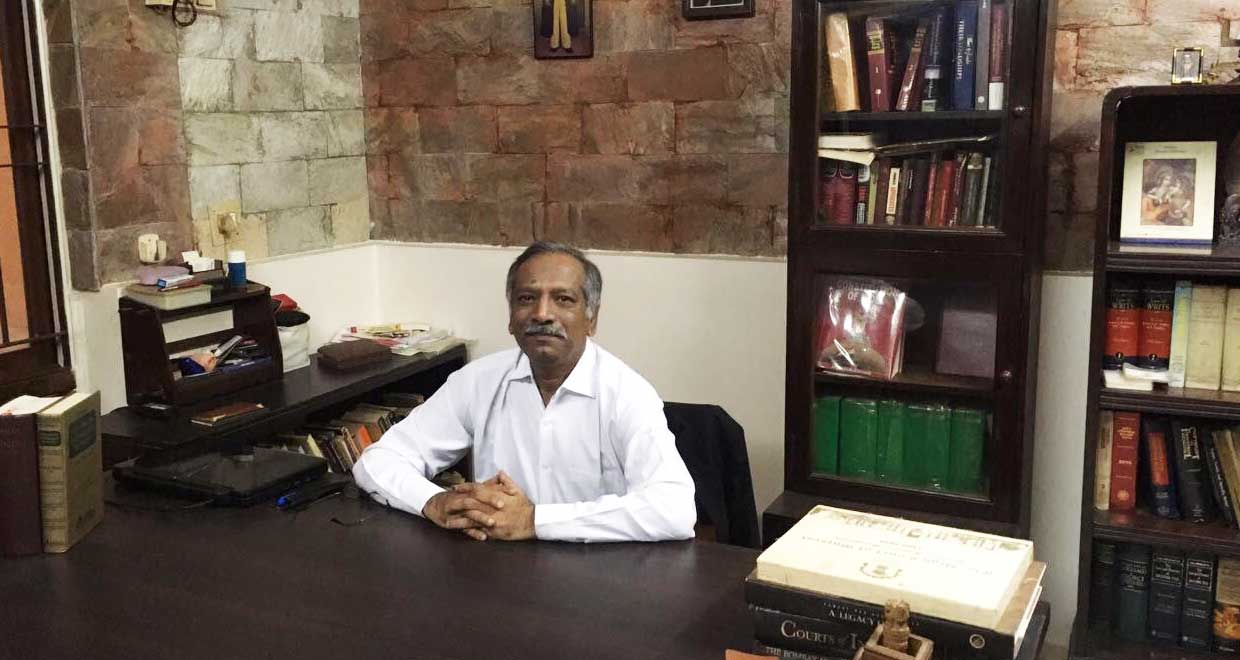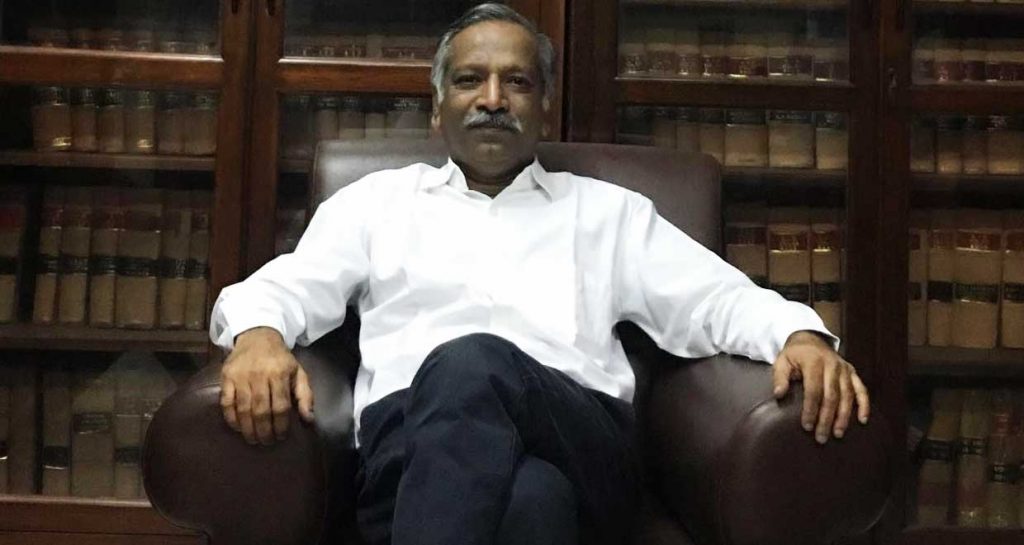Satyajeet A. Desai qualified in law from L. A. Shah College, Gujarat University, in 1988. Soon after graduation he started practice under the tutelage of Suresh Shelat and thereafter Kirtikant Nanavati. In the years to come he worked extensively in various laws including Company and Securities Law and garnered a lot of recognition and accolades.
He is currently practicing at the Gujarat High Court and is known widely as an authority on Hindu Law. He is the current editor of “Mulla on Hindu law” and of “S.T Desai on Partnership”, both published by the LexisNexis Butterworths.
In this dialogue with him, we speak to him about:
- His life as a lawyer and a lecturer.
- His role in contributing to the literature on Hindu Law.
- His experience with Companies, International Airlines and Individuals.
- His ideas about evolution of “Advocacy” as a profession.
Please tell us a bit about your pre-college years, your life as a student and your ambitions as a young man. Did you have lawyers in your family or among close relatives who inspired you?
Every youngster has dreams of following some profession or doing some business. Academically, I was better than an average student, my strong points being languages and history rather that mathematics and science. I always scored really well in languages and history and realising this, I decided on the profession of Law as my career choice. I believe that what shapes one’s career decision is not only one’s choices but also the atmosphere one surrounds himself with. In my case, my grandfather, late Justice S. T. Desai has been my hero and idol. Observing him working as a leading Senior Advocate at the Supreme Court, inspired me to become a lawyer. Again, I come from a long line of lawyers, with my great grandfather T. R. Desai and his father R. K. Desai before him both being lawyers of repute.
How valuable would you say your legal education was and when did you actually experience the learning curve? Also, looking at the booms and busts in the legal industry, what do you think about the future of legal education in India?
In our time during the Mid-Eighties, the law programme was for three years. There were no five year courses offered as they are today. We had some fine professors and visiting faculties, so overall, my law college experience was quite good. The future augurs well for the profession.
The Legal education in our country is good, but the number of law colleges should not mushroom much. I would want successful lawyers to come forward and teach the students, because their experiences would benefit them more, as compared to only learning the basics at law schools. I would love to quote an incident during my student days here.
Once the Professor for Drafting and Pleadings, who was a leading civil court practitioner himself, gave us a home assignment, asking us to draft a Plaint on behalf of an illiterate lady whose property had been taken over by fraud. We all turned in the assignment, duly completed. After a couple of days, the professor told us that though the Plaints were good, only one would pass muster that was mine. The reason was that apart from the issue at hand, I also concentrated on the Plaintiff being illiterate and I placed a thumb mark where the Plaint was supposed to be affirmed. He pointed that out to all of us.
Later, he asked me how I hit upon the correct thing to do. I told him that “I probably looked up for the same book from which you gave us the assignment.” He said, “You have managed to do two things today, draft well, and look up for older precedents”. This was a valuable lesson indeed!
Did you participate in any extracurricular activities while at law school?
I participated in moot court competitions when I was in law school. There were not many moot court competitions then, but that was a good learning experience for me. It also helped me to work with what was to come later. So far as the internships are concerned, during our early years, we did not have any formal internships as in the five year law programme today, but as I said, I wanted to be nothing else but a lawyer, so, I interned with Mr. Suresh Shelat, a Senior Advocate at Gujarat High Court, from the end of the first year at law school till my last year. With this Internship, I got hands on experience of Courts and Litigation and this helped me get an early exposure to the world of Indian courts.
What are your areas of interest in the legal field?
I have always been interested to work on commercial laws, and I have been working on the same as well. I also had the opportunity of working on an interesting matter on Aviation Law, the matter relating to an air crash. The case involved an International Convention to be interpreted. For me, the point of interest was the reciprocity arrangement between the two airlines, The carrier that crashed and the International Airline, I represented. I succeeded to show the lack of reciprocity arrangement between the airlines.
Another field I am very passionate about is Hindu Law. It is fascinating and challenging as the basis lies in old and classical Hindu Law, despite legislations like the Hindu Succession Act and Hindu Marriage Act.
How were your early years as a lawyer?
My professional journey as a lawyer was full of challenges. After working with Mr. Suresh Shelat, I worked with Kirtikant Nanavati, Senior Advocate, at his law firm. I would like to share here an incident- once, when I was working with Mr. Shelat.
Mr. Shelat was arguing a matter before the High Court, which spilled to the afternoon session. The issue was interesting, so I went to the High Court Library in the afternoon and I looked up on a particular issue that I felt was important. I found a judgment on that issue and showed it to my senior. In the course of his arguments later, he referred to that issue and the judgment. The court allowed the matter based on that issue. When the court asked him about the issue, my senior pointed out last and pointing towards me he told the court that, ” my associate Mr. Desai must take the credit for that.” I was floored with the magnanimity shown by Mr. Shelat to a raw junior at the Bar.
When you are a junior, you not only try to do your best so that it helps you develop as a lawyer, but you also try to get a foothold in a very challenging profession. I believe that hard work and dedication, both, are required to excel, no matter what the field be.
You have a long and illustrious career as one of the most reputed advocates in India and as a top notch Jurist. What are the primary soft skills necessary in order to have a successful career in the legal profession?
A lot of times lawyers come across as assertive and opinionated because of the nature of their profession. But that is a part of the overall build-up of a lawyer. I would like to mention a few soft skills, as you call them, which are necessary to have a successful career in the legal profession.
The first and foremost being that a lawyer must have the patience to listen to his client and gather the necessary information that will help him or her understand what the client wants. Another skill that I think is important is guiding the client properly. Clients sometimes come to us wanting to take immediate legal recourse by the way of litigation. The real success of a lawyer in such a situation is, to try and ascertain whether the issue can be settled by correspondence, and or negotiation. For me, Litigation is always the last resort.
How was the court atmosphere before as distinguished from now? Did judges talk kindly to new orators? Also, please share with us your experiences during the first few sessions of the court? Do you think it has become more difficult for a fresher to be successful?
When I initially started my practice, we had some Judges who were really good to the juniors. Their encouragement to perform always encouraged us to better ourselves. I would again like to quote an incident here.
As a newly minted lawyer, I filed a Petition on behalf of an employee of the Central Government. The petition was against his new transfer soon after he had been transferred to Ahmedabad. The rule then was that normally an employee should not be transferred for 3 years. The judge during the initial hearing, probably wanting to know whether I had researched on the issue, asked me whether there was any judgment on the issue?
On my affirmative reply, he asked me to come back in the afternoon session with that Judgment. I said that I had the judgment right there and I sought the permission to site it, but before I could open the book, the judge issued notice and granted a stay. He told me that he wanted to find out whether I was ready with the precedent or not.
I would also like to quote one more incident which is close to my heart. A lawyer had filed a revision application challenging an order of the Civil Court. I was on the opposing side. I succeeded at the end of the hearing. A few months thereafter, I filed a similar matter with the same lawyer opposing me. He pointed out the earlier order to the Judge. The Judge looked at me, smiled and said, “Mr. Desai, you can’t win them all. Petition Dismissed.” I replied with an answer that a similar thing happened to Abraham Lincoln when he was practicing law. The judge asked me about the incident. I replied that when Lincoln was defending a matter in the morning session, the Plaintiff failed and Lincoln succeeded for the Defendant. He was appearing in a similar matter for the Plaintiff in the afternoon session. The judge told him that he must fail now because he succeeded in a similar matter in the morning session. To this. Lincoln’s reply was a classic. He said “I was wrong in the morning session, so I must succeed now.” Well, I lost the matter, but the Judge asked to borrow the book I read the quote from.
According to me, to become successful, and by that, I don’t mean monetarily, one must put in hard work and inculcate the habit of general and vast reading, even apart from law. For a fresher to be successful, he or she must put in the labour. Success never comes overnight.
In the past you participated in the Law Commission Workshop on making changes to the Hindu Succession Act. How was the experience?
 Yes, I was invited to a workshop by the Law commission in 1998, when changes to the Hindu Succession Act were being debated upon.
Yes, I was invited to a workshop by the Law commission in 1998, when changes to the Hindu Succession Act were being debated upon.
For one, the experience was very satisfying, as you feel that you are helping towards the progressive development of law. The recommendations presented in that workshop ultimately culminated into amendments to the Hindu Succession Act in 2005. We were debating over a particular issue and one of the delegates posed a question to which Justice Jeevan Reddy, the then Chairman of the Law Commission replied. Justice Leela Seth, the then Vice Chairman, looked at me and asked about my thoughts on the issue. In a lighter vein, I replied that whatever I wanted to say, I already wrote in Mulla’s Hindu Law. Of course, I answered the question thereafter.
You are a visiting lecturer at several colleges. How is it important for a lawyer to pass on the learning and the experience?
Currently, I am a visiting faculty at LJ College in Ahmedabad. I have previously lectured at Ahmedabad University, United World Law College and Knowledge Academy. I am often called for guest lectures at various colleges. As I mentioned earlier, I believe that it is very essential for a practicing lawyer to teach at least a few times a year .It would help the students get hold of what they will be facing when they enter the profession. Knowledge only increases when you pass it on.
You are greatly interested in writing and reading outside of law, can you throw some more light on your hobbies?
So far as my hobbies are concerned, I would say that reading is a must. I get drawn into whatever book I read, whether it be fiction or non-fiction. Writing on law is passion and a prayer for me. People go to places of worship to pray but for me, writing is my prayer; it’s my holy grail. I would also add here that if you want to write on law, firstly you should be passionate about the subject you want to write about and secondly, you must research it well. Your analysis of law must be palatable in order to be accepted. Also, the language must be lucid and proper so that the reader immediately grasps the point .
What were the landmarks of your career? Please share with us the challenges and achievements you came across on your journey from being a fresh graduate to one of the most renowned lawyers/jurists in Family Law practice?
Success is a relative concept, looked at from different angles and eyes. I have appeared for Companies, International Airlines, and a lot of Individuals. You may feel that I am underplaying the situation, but I got great satisfaction in appearing for the companies that challenged an order by the Government, and we were successful in that challenge. But I got the greater satisfaction when I appeared for the three poor brothers whose lands were resumed by the Government, and I successfully helped them out, pro bono. I also do a lot of opinion work on Hindu law and some factual situations I came across, fascinate me even today, because the facts for the most part, are always unique. Being invited for the workshop on the Hindu Succession Act was a landmark for my career.
You have several best-selling legal books like ‘Mulla on Hindu Law and S T Desai on Partnership’ to your credit. How important is writing for you?
Legal writing is very important for me. It is my passion. After all, words are a lawyer’s tools and what better way to contribute to this great profession than to give something back by writing on subjects that you are passionate about.
Can you describe a regular day in your life?
My typical day starts around 5 AM. I Get up, have a rejuvenating cup of coffee, start reading for whatever court work I have that day, go to court and attend hearings I have. Back home after court, I attend the meetings with clients (in my case non litigation clients on Hindu law as well). I teach once a week, which keeps me firmly earthed and I also stay in touch with academia.
What advice would you have for our readers who are primarily college students?
My advice to law students is that study well but also indulge yourself with general reading as that will help you in building your overall personality as a lawyer. Amongst all the professions, law is probably the only profession where you are required to interact a lot verbally. Keep reading and stay updated with the current news and events. You never know when it might come to your aid, After all, a lawyer is required to think on his feet. General reading helps a lot. Your arguments may sound even better if they are interspersed with quotes or similar situations or even humour at times.


























Pingback: SATYAJEET DESAI